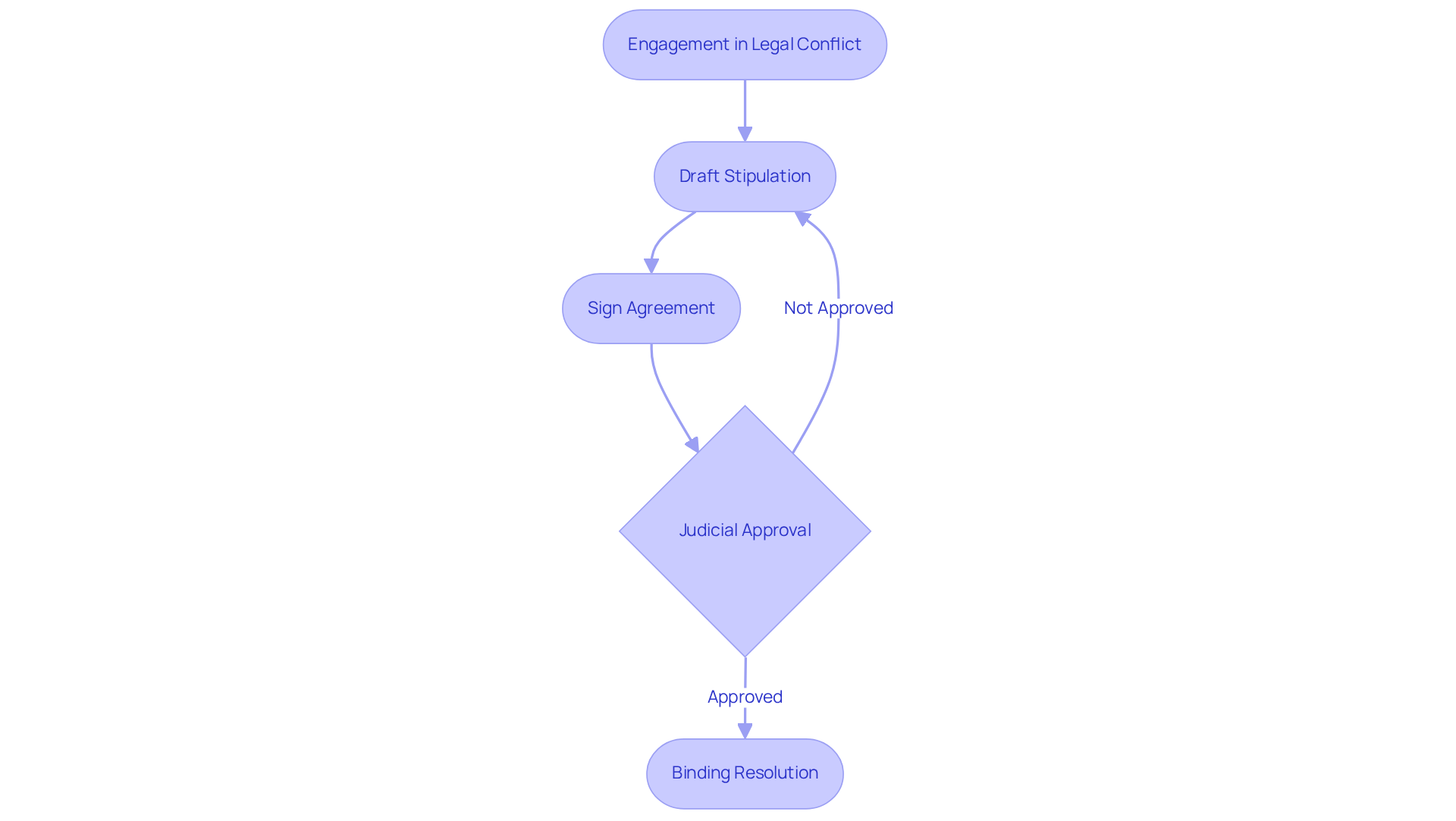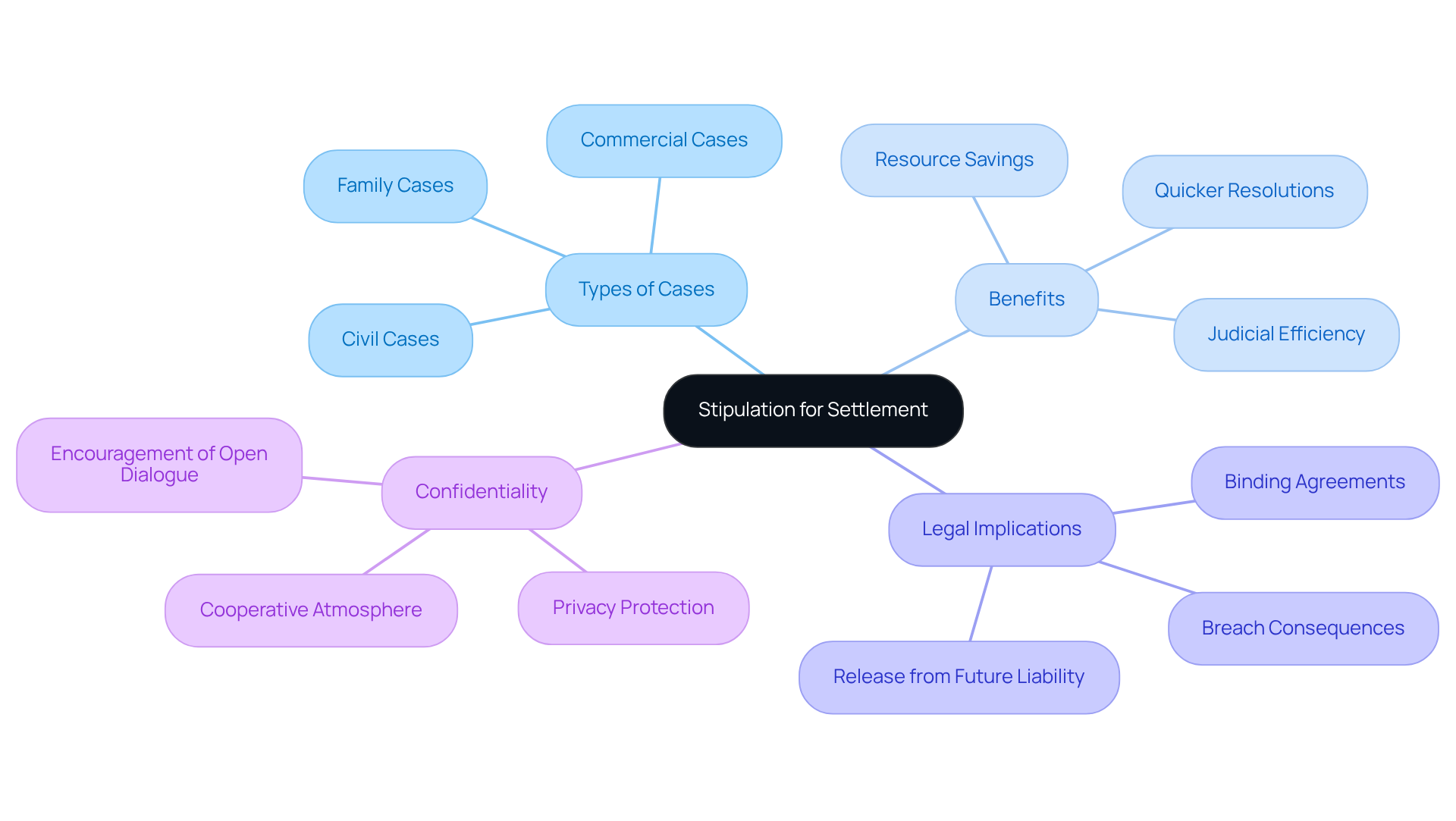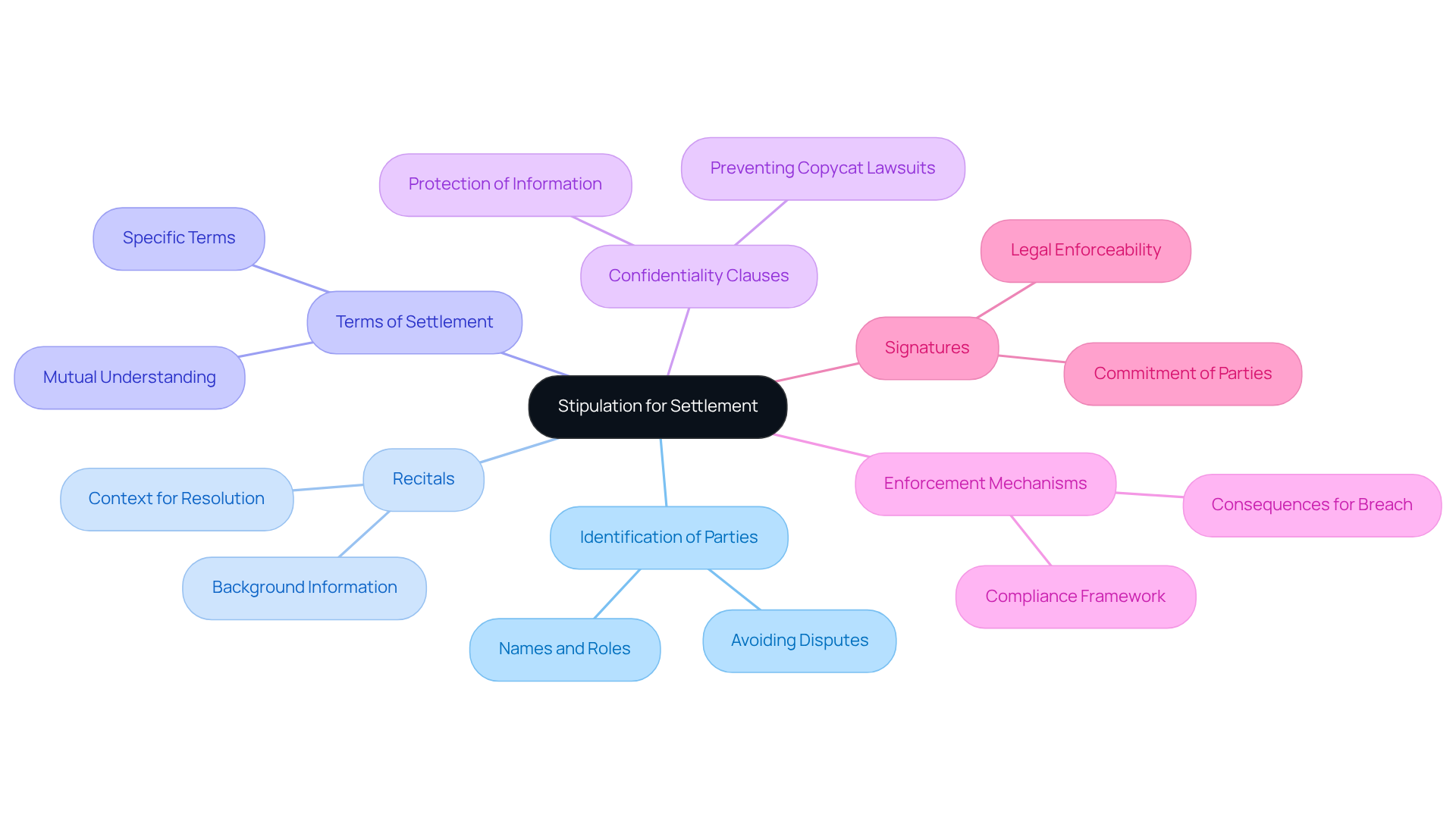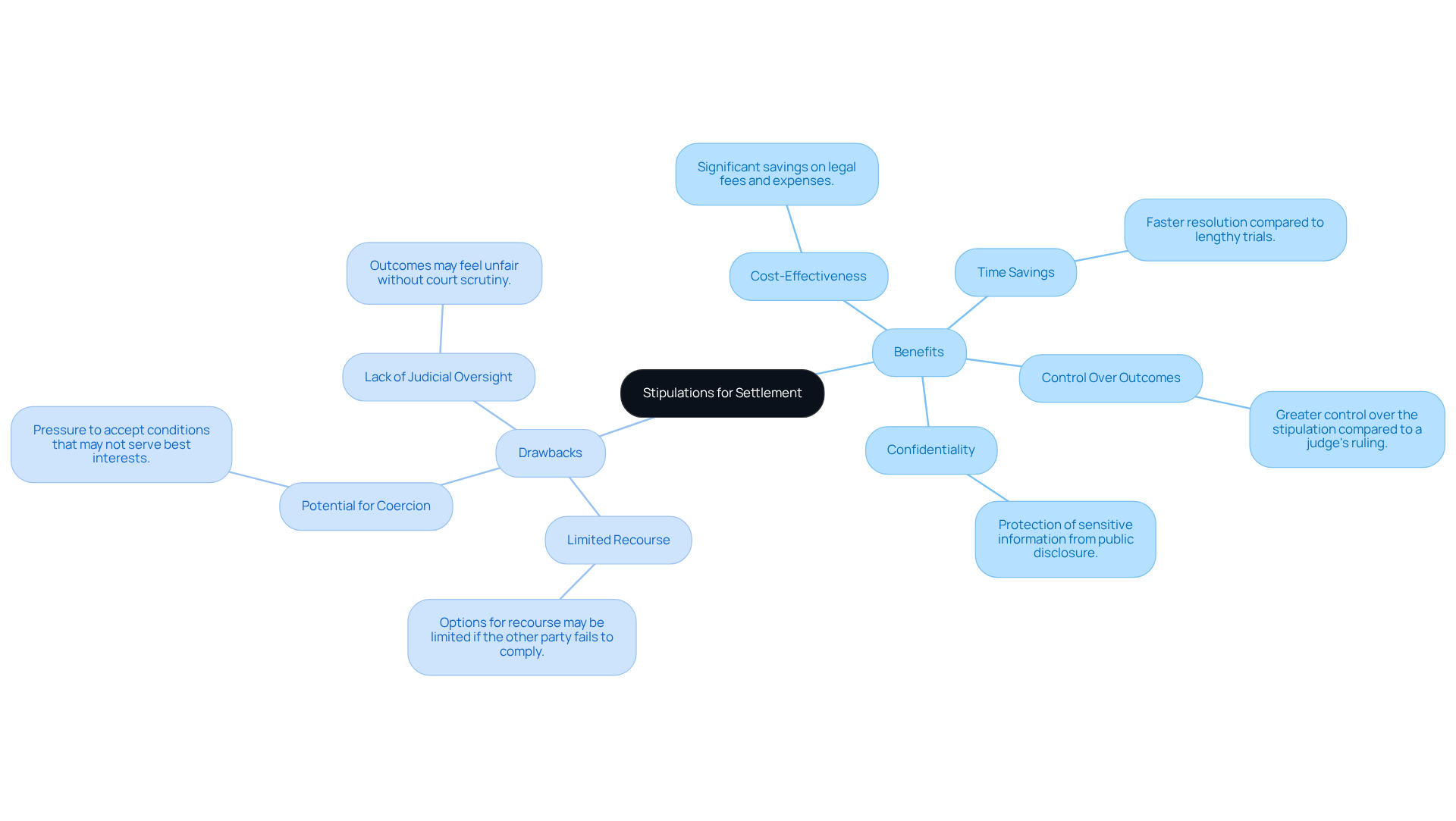
Stipulation for Settlement: Definition, Context, and Key Components
Overview
A stipulation for settlement is more than just a formal agreement; it’s a compassionate step toward resolving differences in a legal dispute. By outlining the terms for resolution without the stress of a trial, it becomes a legally binding commitment once signed.
Have you ever felt overwhelmed by the complexities of legal matters? This process not only enhances judicial efficiency but also significantly reduces costs, allowing you to focus on what truly matters. It promotes cooperation, inviting all parties to actively participate in shaping the resolution.
This collaborative approach can lead to higher compliance rates and help preserve important relationships. Imagine being able to move forward without the burden of unresolved issues weighing you down.
We encourage you to consider the benefits of mediation and arbitration in your journey. By embracing these options, you can foster understanding and find a resolution that respects everyone's needs.
Introduction
A stipulation for settlement plays a crucial role in our legal landscape, helping individuals caught in disputes find amicable resolutions without the stress of a lengthy trial. This formal agreement not only lays out the terms of the settlement but also nurtures collaboration and understanding among everyone involved. Yet, as the stakes increase, so do the complexities—what occurs when one party doesn't fulfill their obligations?
Exploring the essential components and implications of stipulations for settlement uncovers both their potential benefits and the challenges that can arise. It's important to consider how these agreements can pave the way for smoother resolutions, and we invite you to reflect on their role in modern legal proceedings. Together, we can navigate these complexities with care and understanding.
Define Stipulation for Settlement
A condition for resolution is a formal arrangement among individuals engaged in a legal conflict, detailing the terms under which they consent to address their disagreements without going to trial. Have you ever felt overwhelmed by the thought of a legal battle? This document is usually composed and endorsed by all participants involved, and it may also need judicial approval to become enforceable. It acts as a guide for the resolution, outlining the responsibilities of each participant and the criteria that need to be fulfilled for the agreement to be upheld.
It's crucial to understand that a stipulation for settlement becomes legally binding once it is signed. This means that failure to comply can result in legal consequences. However, mediation frequently leads to greater adherence to established terms because both sides are involved in formulating the resolution. Legal professionals highlight that these agreements not only offer clarity but also promote a cooperative atmosphere, increasing the chances of adherence and maintaining connections between involved individuals.
As litigator Jimenez Mazzitelli Mordes notes, mediation empowers clients to actively shape the outcome. This involvement can lead to higher compliance rates and potentially preserve valuable relationships. Imagine the relief of resolving conflicts amicably! Additionally, mediation reduces the emotional toll of disputes by fostering a collaborative atmosphere, allowing for more productive discussions.
In this journey, we can navigate the complexities together, ensuring that your voice is heard and valued.

Context and Importance in Legal Proceedings
Stipulation for settlement is vital in various legal proceedings, including civil, family, and commercial cases. Have you ever felt overwhelmed by the thought of a lengthy trial? These stipulations for settlement can greatly improve judicial efficiency by enabling individuals to resolve disputes without enduring the drawn-out process of a trial. This approach not only saves time and resources for everyone involved but also lightens the workload on our court system.
In fact, studies show that approximately 95% of civil cases settle before reaching trial. This statistic highlights how crucial a stipulation for settlement is in facilitating timely resolutions. It’s important to understand that the stipulation for settlement makes these agreements legally binding. Breaching their terms can lead to serious consequences, underscoring the need for compliance with the conditions laid out.
Moreover, confidentiality agreements in resolutions protect privacy and reputation. This fosters a cooperative atmosphere that encourages open dialogue and collaboration among parties. Can you imagine how this can lead to mutually beneficial outcomes?
By optimizing the resolution process, conditions for resolution contribute to a more efficient judicial system, ultimately benefiting all parties involved. We believe that Alternative Dispute Resolution (ADR) is dedicated to achieving practical results and ensuring client satisfaction in dispute resolution. This commitment reinforces the effectiveness of these agreements and the positive impact they can have on your experience.

Key Characteristics and Components
A stipulation for settlement serves as a crucial legal document that includes several key components to ensure clarity and enforceability.
-
Identification of Parties: This section clearly states the names and roles of all parties involved in the contract, ensuring that everyone is accurately represented. Clear identification is essential to avoid future disputes. Have you considered how vital it is for everyone to feel understood in these situations?
-
Recitals: Here, background information about the dispute is provided, offering context for the resolution and helping to clarify the reasons behind the understanding. Understanding the context can foster a sense of connection and clarity.
-
Terms of Settlement: This outlines the specific terms agreed upon, including any payments, actions to be taken, or conditions that must be met. These details are essential for mutual understanding and can significantly ease tensions. Are you aware of how important it is to have every legal issue addressed in this section?
-
Confidentiality Clauses: Provisions that protect the confidentiality of the settlement terms are often included. These safeguard sensitive information from public disclosure and potential copycat lawsuits. Effective confidentiality provisions are essential for safeguarding the interests of everyone involved. Can you imagine how reassuring it is to know that your information is protected?
-
Enforcement Mechanisms: This outlines how the stipulation for settlement will be enforced, including consequences for non-compliance. Clear enforcement mechanisms provide a framework for addressing breaches, ensuring adherence to the contract. Isn’t it comforting to know that there are measures in place to uphold agreements?
-
Signatures: The document requires the signatures of all individuals involved and, in some instances, the approval of a judge, which is necessary for its legal enforceability. Formalizing contracts is crucial to ensure they are binding. Have you thought about how important it is to have everyone’s commitment?
These components work together to establish a thorough agreement that reduces ambiguity and defines clear expectations for all individuals engaged. By addressing these elements, parties can effectively navigate the complexities of dispute resolution and improve the chances of a successful agreement. Together, we can foster understanding and support through this process.

Benefits and Drawbacks of Stipulations for Settlement
Stipulations for settlement offer several advantages that can truly benefit you, including:
- Cost-Effectiveness: Settling disputes through stipulations can lead to significant savings on legal fees and other expenses that come with prolonged litigation. Did you know that the average account settlement amount after fees is around 32%? This highlights the financial benefits of resolving disputes early, allowing you to focus on what matters most.
- Time Savings: These arrangements can speed up the resolution process, helping you avoid the lengthy trial process. The timeline for settling personal injury cases can range from a few months to several years. For those seeking quicker resolutions, agreements can be an appealing choice.
- Control Over Outcomes: One of the most comforting aspects is that you retain greater control over the stipulation for settlement compared to a judge's ruling. This means you can tailor agreements to fit your specific needs, providing a sense of empowerment.
- Confidentiality: Many stipulations include confidentiality clauses that protect sensitive information from public disclosure. This can be essential for preserving your privacy during challenging times.
However, it’s important to also consider some notable drawbacks:
- Limited Recourse: Once a stipulation is signed, your options for recourse may be limited if the other party fails to comply. This could lead to unresolved issues that weigh heavily on your mind.
- Potential for Coercion: In some situations, one party might feel pressured to accept conditions that don’t truly serve their best interests. This raises ethical concerns about the negotiation process, and it’s crucial to be aware of this possibility.
- Lack of Judicial Oversight: While stipulations can streamline processes, they may lack the scrutiny that comes with a court trial. This can sometimes result in outcomes that feel unfair if not carefully considered.
As you contemplate a stipulation for settlement, understanding these factors is essential. Weighing the benefits against the potential risks is a thoughtful approach that can guide you toward making the best decision for your situation.

Conclusion
A stipulation for settlement is a vital tool in resolving legal disputes, enabling parties to agree on terms that help avoid the burdensome trial process. This formal agreement not only clarifies responsibilities and expectations but also nurtures cooperation among individuals, creating an environment that is conducive to amicable resolutions.
Throughout our discussion, we have highlighted several key aspects, including the definition and significance of stipulations for settlement in various legal contexts. We explored the essential components that make these agreements effective, as well as the advantages and disadvantages associated with their use. The emphasis on mediation as a means to empower clients and preserve relationships further illustrates the value of these agreements in the legal landscape.
Ultimately, understanding the intricacies of stipulations for settlement is crucial for anyone navigating legal disputes. By weighing the benefits against potential drawbacks, you can make informed decisions that not only resolve your issues but also contribute to a more efficient judicial system. Embracing this approach could lead to more constructive outcomes, encouraging a shift towards collaborative conflict resolution in legal matters.
So, as you consider your options, remember that you are not alone in this journey. Together, we can work towards solutions that foster understanding and collaboration, paving the way for a brighter future in your legal endeavors.
Frequently Asked Questions
What is a stipulation for settlement?
A stipulation for settlement is a formal arrangement among individuals involved in a legal conflict, outlining the terms under which they agree to resolve their disagreements without going to trial.
What does a stipulation for settlement include?
It typically includes the responsibilities of each participant and the criteria that need to be fulfilled for the agreement to be upheld.
Is a stipulation for settlement legally binding?
Yes, a stipulation for settlement becomes legally binding once it is signed, meaning failure to comply can result in legal consequences.
How does mediation impact compliance with a stipulation for settlement?
Mediation often leads to greater adherence to established terms because both sides are involved in formulating the resolution, which promotes a cooperative atmosphere.
What are the benefits of a stipulation for settlement in terms of relationships?
These agreements not only provide clarity but also increase the chances of maintaining connections between the involved individuals, potentially preserving valuable relationships.
How does mediation differ from traditional legal battles?
Mediation empowers clients to actively shape the outcome, leading to higher compliance rates and reducing the emotional toll of disputes by fostering a collaborative atmosphere for more productive discussions.


